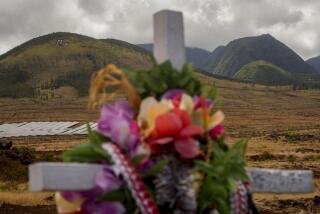At the Palace Hotel
Four days before he died, the last king of Hawaii spoke into a recording machine while propped up on pillows in his suite at the Palace Hotel. There are two versions of what he said that afternoon and why he said it. The official version, released to papers and soon featured in ads by the Edison General Electric Co. to promote their new device, has been often quoted.
I heard the unofficial version from my grandmother, who heard it from her mother, who happened to be there at the time, a half-Hawaiian woman who in earlier years may have been the king’s lover. How she came to be lying next to him in the Palace Hotel on that fateful afternoon has intrigued me for quite a while and is what now compels me to try and get this story told, and the story of her family, which is the story of my family too. Suffice to say that she was then 27, small and buxom, with an erect, aristocratic bearing. She had eyes blacker than obsidian, black hair that fell to cover half her legs, if she wore it loose, and a lifted edge to her upper lip that made the mouth a bit fuller. In the midst of her classic Polynesian features lurked a mystery that had long beguiled the king. Call it the Indian factor. Her father was from Hawaii. Her mother was from a California tribe based north of Sacramento. Coming of age when she did, in the later years of the 19th century, she’d learned to speak several languages. This too appealed to the king, since he saw himself as a cultivated man, a multilingual and pan-Pacific man. Maybe that accounts for some of the distance between him and his wife, Queen Kapiolani, who was a proud and elegant woman, also descended from a line of ruling chiefs. By choice, and as a point of honor in an island realm increasingly controlled by outsiders, the queen spoke only Hawaiian.
King David Kalakaua claimed to be the advocate for all things Hawaiian--the language, the music, the dance, the ancient arts of healing and chanting. Yet he was drawn, in a compulsive and sometimes destructive way, to all things foreign and Western and worldly and new. My great-grandmother, Nani Keala (a.k.a. Nancy Callahan), gave him some of both. As his sometime consort and also a member of the royal entourage, she had learned to dance his favorite dances and sing his favorite songs. In his eyes she was Hawaiian yet foreign, familiar yet exotic.
During his 17 years on the throne his detractors called him promiscuous and dissolute, a man whose addiction to the pleasures of the flesh left him incapable of ruling anything, let alone a mid-Pacific kingdom. In my view this was too harsh a judgment, given the way he’d been trained from youth. At his birth, as was the custom among high-born Hawaiians, a song was composed to celebrate his genitals, to give them a name, and to prophesy what feats they would accomplish later. With this as your infant lullaby (and it was only the first of dozens of songs about his private parts that he would hear at parties and festive occasions throughout his life), what else could anyone expect? As a man of chiefly lineage, it was an inherited duty to display his prowess and spread his seed, and this was a duty he had not shirked. But as of January 1891, as Kalakaua lay in his bed above the muffled flow of trolley cars and carriage traffic along Market Street in downtown San Francisco, those feats were far behind him.
He was 54 and pale, in failing health. His once-commanding eyes had lost their luster. One attending physician said he suffered from a malarial fever. Another said it was an affliction of the kidneys. If pressed, my grandmother would pass on what she once had heard from her mother, who told her that these symptoms had come on too suddenly, that the king’s health had been tampered with--a theory that may or may not hold up, depending on whom you talk to. That great-grandmother of mine, I think she had a paranoid streak, which is not uncommon in the Hawaiian Islands. It made her susceptible to conspiracy theories of every type. On the other hand, she was there when these things happened.
The official version goes like this:
Sometime in the middle of January a man named Louis Glass, local manager of the Edison Co., had come to the hotel and asked the king’s attendants if he might not enjoy having his voice recorded. Hearing Glass’ request, the king said bring him in. His illness, whatever it was, had not dampened his keen interest in new inventions. He took pride in keeping pace with the modern world. As soon as he’d heard about the telephone, two years after it was invented, he ordered several to be shipped to Honolulu and installed in the royal household. So it was arranged that, next to his enormous bed, an intricate contrivance was set up made of small wheels and pulleys and accouterments of polished metal. It was all portable, housed in a container made of walnut, and ran on storage batteries, two unwieldy bottles half full of acid, with wires protruding from the lids. A length of flex hose rose to a conical mouthpiece. There was an armature with a pointed stylus resting on a cylinder the size of a thick candle and made of chocolate-brown wax.
Glass explained that by speaking into the tube, one’s voice was transmitted through the needle and impressed into the wax in a thin spiral of tiny peaks and valleys, from which the sound could then be reproduced.
“You mean my voice will be preserved?”
“That’s correct, Your Majesty.”
“Everything I say?”
“Every word.”
“I find this amazing.”
Glass pushed the phonograph a little closer to the bed and waited. The king’s physicians waited too, as did his aide-de-camp and his chamberlain, a colonel in the Hawaiian Guard, there to keep the world at bay as well as to observe the monarch’s every move and conversation. For his island kingdom these were perilous times. Any misstep could be costly. Before falling ill he’d been en route to meet with President Harrison, some said to seal a deal that would seal the fate of his people and finally annex Hawaii to a foreign power. Ahead of him, in Washington, D.C., influential senators were lobbying for a permanent hold on Pearl Harbor, said to be the finest anchorage in the Pacific, while behind him, overseas American sugar growers were pressuring to maintain low tariffs that had already made them wealthy. The king, caught in the middle of these negotiations, had so far been keeping his intentions to himself.
He reached out as if to grasp the mouthpiece, then shut his eyes against a wave of fatigue. Glass waited for the eyes to open. A labored, steady breathing told him the king had dozed off.
The next day he returned, and now Kalakaua was ready to be raised, to have his body positioned so that, without moving his head, he could hold the speaking tube to his lips. The words came slowly, his voice ragged.
“Aloha kaua,” he said. (Warm greetings.) And then again, “Aloha kaua . . .” Perhaps he was addressing his subjects back home, or perhaps the strange power of the machine itself. Or perhaps both. Speaking in Hawaiian he went on, “We will very likely hereafter go to Hawaii, to Honolulu. There you will tell my people what you have heard me say here . . . “
He paused, as if on the verge of a larger thought. But his energy failed him. He fell back upon his pillows and closed his eyes, inhaling with great effort. Again Glass waited, again the king was silent, exhausted.
Three days later he fell into a coma, and within one more he had died in his room at the Palace Hotel at 2:35 p.m. A U.S. Navy cruiser carried his body back to the islands. The wax cylinder followed on another ship and thereafter was played only with the consent of Kalakaua’s widow. While many others heard the faint and graveled message, she was too bereaved to listen. Soon afterward the monarchy was overthrown by a coalition of island businessmen and American Marines. In the ensuing turmoil the cylinder disappeared. Hawaii moved into the 20th century firmly joined to the United States, and the king’s last and all-too-brief public utterance was but another lost gesture from a royal family whose moment in history had come and gone.
So goes the official version. But according to my great-grandmother, the king had a good deal more to say that day.
Glass was disappointed, she said. He had hoped for something else. He sat there until the king opened his eyes, then asked if he would mind trying it again a bit louder, and would he mind speaking in English this time?
Glass, it seems, had his own agenda that day. He had not hauled all this equipment up to the third floor of what claimed to be the world’s largest hotel simply for the king’s entertainment. Having a record of the royal voice could be a manager’s dream. He could use it all up and down the West Coast. He could play it for business leaders who would love the idea of dictating letters into a machine like one that had recorded the voice of royalty. But he needed to hear the king speaking in a language his prospective customers could understand.
Kalakaua nodded, as if untroubled by this request. He waved to his physician--a tall, imposing fellow with muttonchops and military eyes--who propped him up again, while a happy Mr. Glass replaced the first wax cylinder with a fresh one.
“Now?” said the king.
“Whenever you’re ready.”
There was new life in Kalakaua’s voice, new blood brought color to his face. “Aloha kaua,” he said again, and then continued, speaking with an eloquence that seemed uncanny coming from such a frail and fevered body. Between the first and second takes something had shifted, as if that little rehearsal had cleared his mind, cleared his heart and set his spirit free. Glass was waving a hand back and forth, signaling “No! No!” as he mouthed the word “English!,” shouting in silent pantomime. But the king ignored him. He was almost his old self, speaking the poetic Hawaiian he’d been schooled in from youth.
Had he never ascended to the throne, Kalakaua would have been famous as a musician and composer. He’d composed dozens of songs, some of which are still performed today, songs that were also poems filled with imagery and layers of meaning. The trained Hawaiian poets were skilled in telling stories, painting word pictures that could mean three or four things at once. A song in praise of seaweed swirling at the water’s edge might also refer to your girlfriend’s pubic hair, and at the same time mock the reputation of a rival chief.
From his sickbed the king was composing on the spot, speaking in a poetic code that would be understood by all his people back home, but was entirely lost upon Mr. Glass, who hailed from Maryland. It was lost on the attending physician, a career naval officer assigned to the USS Charleston, then anchored in San Francisco Bay. The king’s chamberlain was on this day confined to separate quarters across the hall, fighting a fever of his own. And the chamberlain’s assistant, his aide-de-camp, had heard a knocking at the door just as the king began to speak again. Having witnessed the first feeble message, he took this all to be a harmless exercise and so stepped out into the corridor.
The only one present who could follow the words being etched in wax that afternoon was my great-grandmother, under the covers, waiting for him to lie back down so she could place her hands upon his chest and upon his liver.
She practiced a form of passive massage whereby the hands and arms become conduits of soothing, healing heat. In years past it had been one of the games they played, as her hands touched first the pinched shoulder or the aching neck, then slid down to deal with other aches.
But on this day he craved her warmth alone, believing that the heat of her hands might counteract the heat of his fever. She believed this too. She knew every inch of his body, and her hands told her it was not too late, that this sickness could still be cured. On her, none of his poetry was lost.
He was speaking now of sea birds and the many colors of the sea and large canoes arriving from afar. They sail toward a wide river of orange lava pouring down a mountainside to spill into the coastal surge. The lava roars with the deep-throated voice of the fire goddess. Where it meets the water, billows of steam swell up like fog and cause the canoes to lose their way. These are large vessels with many sails and so heavily armed they are difficult to steer. One by one they founder on the reefs, while out of the cloud-white steam appears an outrigger canoe bearing a single paddler with arms so strong he seems to fly across the sea.
For two minutes he spoke like this, seeming to gain in volume and urgency, and would have gone on but the stylus, with a scratchy warning, had reached the end of the cylinder.
Mr. Glass clasped his hands in front of his vest, trying to contain his exasperation.
“I’m deeply indebted, Your Majesty. You have been most generous with your time . . . “
“Is it finished?”
“Yes. I only brought two cylinders.”
“And what happened to my voice? Is it now inside the box?”
“It is here, embedded in these grooves.”
“Ah. Well then, meet my companion, Nani Keala. We are both quite eager to hear what I sound like.”
Glass adjusted the playback stylus, attached another flex hose, with ear tubes, and passed these to the king, who listened devoutly, inclining his head like a priest at prayer. He passed the tubes to my great-grandmother, who heard the distant, tinny syllables coming toward her as if from another part of the hotel--not at all the voice she’d just heard filling the room, and yet somehow it spoke the same words, made the same pictures. The faraway place it came from was not somewhere down the corridor. It was from another time. This was the Kalakaua of 10 years ago, the one she’d fallen for. Her eyes glistened with tears.
The king said, “What’s the matter, Nani?”
“Everyone should hear this.”
“Yes . . . yes, this is my hope. Mr. Glass, can you make it louder?”
“One day perhaps. Alas, not yet.”
“No matter. I will take the cylinder with me.”
“In that case, Your Majesty will need a machine.”
“Yes, of course. It goes without saying. I will want one of these delivered to Honolulu, with the ear tubes and all the rest of it.”
Now Glass’ frowning face rearranged itself. A royal sale might salvage and redeem this otherwise wasted expedition. His eyebrows rose in hope.
“Whenever Your Majesty is planning to return home, I can have one brought straight to the ship.”
“Excellent. Excellent. Work it out with my chamberlain.”
“With your permission, perhaps I can deliver the cylinders at the same time, as my personal gift to Your Majesty. You will want them well packaged for the voyage.”
The king thought about this, but not for long. Once again fatigue overtook him. His nod said both “So be it” and “Goodbye.”
With the slow, meticulous moves of a perfectionist, Glass packed up his machinery. Kalakaua, still taken with the workings of this device, watched awhile through lidded eyes, then turned to my great-grandmother. Trying to muster a seductive smile, he murmured, “Have you forgotten where your hands warm me most?”
“Perhaps tomorrow I will remember. Today you must conserve every drop of your energy.”
One hand moved across his chest. The other rested above his colon.
His voice fell to a whisper, “Stay with me, Nani.”
“I will.”
“Whatever they try to tell you, stay right here . . . “
Then Glass was ready. With a courteous bow to the king and a nod to the physician, he took his leave. As if on cue, the aide-de-camp, returning from the hallway, opened the door, and Glass eased past him, bearing the Edison phonograph, the battery bottles and two cylinders of brown wax that contained the king’s final message to the world.
More to Read
Sign up for Essential California
The most important California stories and recommendations in your inbox every morning.
You may occasionally receive promotional content from the Los Angeles Times.










